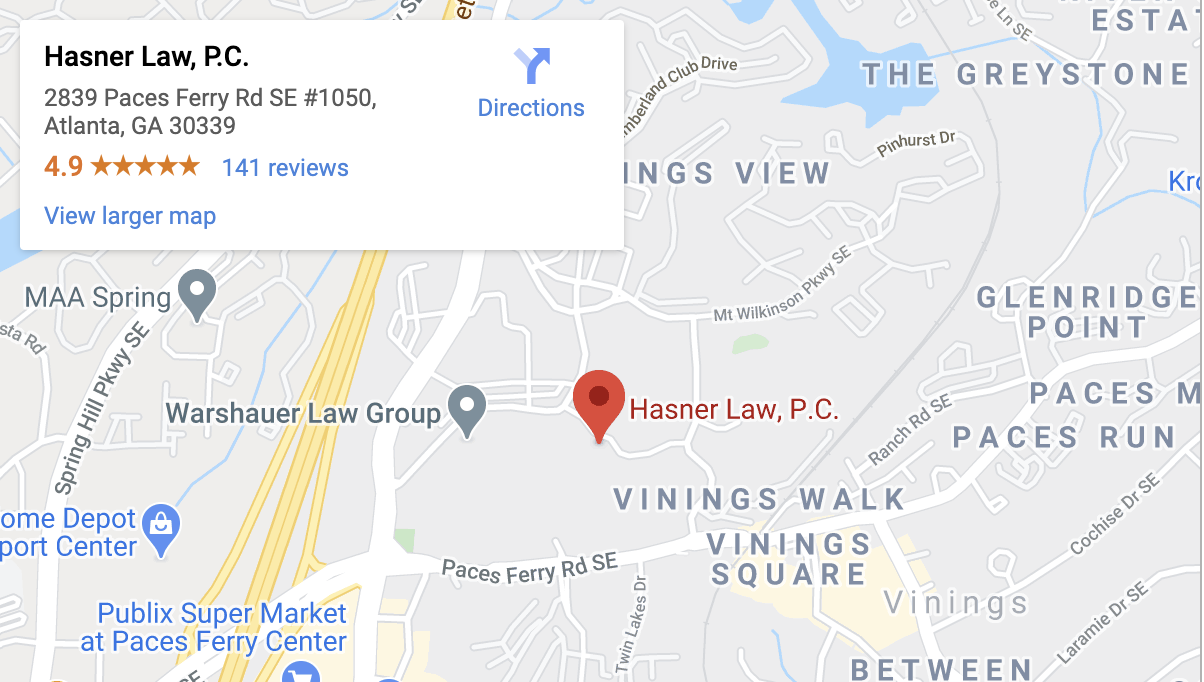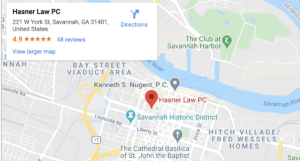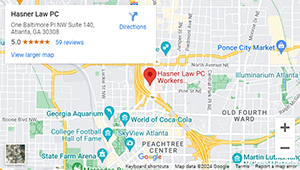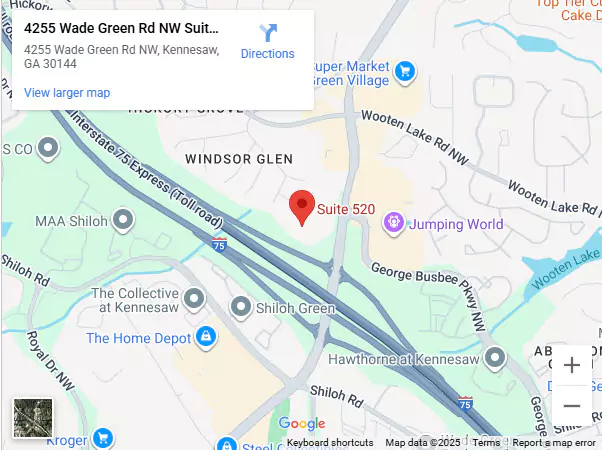Understanding common motorcycle injuries in Atlanta helps riders recognize how vulnerable they are in a crash and why it is important to be aware of the risks on the road. According to the National Highway Traffic Safety Administration (NHTSA), motorcyclists accounted for 15 percent of all traffic fatalities in 2023, with 6,335 deaths, even though they make up a much smaller portion of road users. These numbers highlight a serious fact: in most collisions with larger vehicles, motorcyclists are far more likely to suffer serious injuries or fatalities.
An experienced Atlanta motorcycle accident lawyer understands the lasting impact these injuries can have. If you’ve been seriously injured in a motorcycle crash caused by another driver’s negligence, it’s essential to understand both the extent of your injuries and your legal rights.
Call Hasner Law today at 678-888-HURT (4878) for a free and confidential case evaluation.
Atlanta Common Motorcycle Injuries Guide
- How Hasner Law Advocates for Motorcycle Accident Victims with Serious Injuries
- Traumatic Brain Injuries (TBI) From Motorcycle Crashes
- Road Rash Injuries From Atlanta Motorcycle Accidents
- Spinal Cord Injuries and Paralysis After a Motorcycle Wreck
- Broken Bones and Fractures in Motorcycle Accidents
- Georgia Motorcycle Laws That Impact Injury Claims
- Contact an Atlanta Motorcycle Accident Lawyer Today
How Hasner Law Advocates for Motorcycle Accident Victims with Serious Injuries
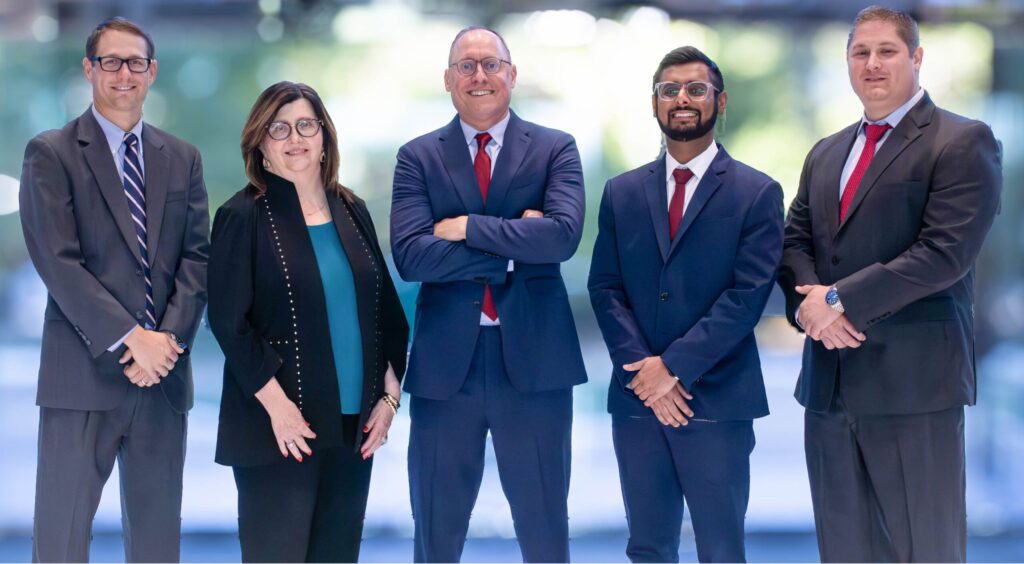
Standing Up to Insurance Companies
Following a serious motorcycle accident, victims often face not only the physical and emotional challenges of recovery but also the added stress of dealing with insurance companies that prioritize minimizing payouts over fairly compensating injured riders.
Insurers may downplay the severity of your injuries, question the necessity of your medical treatment, or pressure you into accepting a low settlement before you fully understand your long-term prognosis.
At Hasner Law, we protect you from these tactics by building a strong case supported by clear medical evidence and detailed documentation of your injuries.
Protecting Your Health and Legal Rights
When you hire an Atlanta motorcycle accident attorney from Hasner Law, we prioritize the human side of your case, focusing on your health, well-being, and future. We understand that your claim is about much more than property damage; it is about obtaining the resources you need to recover and move forward with your life.
Our team manages all communications with the insurance companies on your behalf, shielding you from invasive questions and aggressive settlement tactics. This allows you to focus entirely on your medical care and recovery.
Documenting Motorcycle Injury Claims With Medical Evidence
We leave no detail overlooked in documenting the extent of your injuries. Our legal team collects comprehensive medical records, from your initial treatment at Grady Memorial Hospital to specialist consultations and physical therapy sessions.
We also collaborate directly with your healthcare providers to obtain in-depth medical reports that outline your diagnosis, the origin of your injuries, required treatments, and anticipated future care.
Using Expert Witnesses in Catastrophic Injury Cases
For clients with life-altering injuries, Hasner Law has the resources and experience to partner with top-tier medical and financial experts. In cases involving spinal cord injuries, traumatic brain injuries, or other catastrophic harm, we may consult with life care planners to develop detailed reports outlining your long-term medical needs and associated costs.
We may also retain vocational experts to assess how your injuries impact your ability to work and earn a living. With support from expert witnesses, we present a full picture of your financial losses, physical limitations, and emotional challenges.
Building a Case That Reflects the Full Impact of Your Injuries
At Hasner Law, we are dedicated advocates for our clients. We are committed to telling your story with clarity and compassion and fighting for the full and fair compensation you deserve. Our goal is to secure the resources you need to rebuild your life after a serious motorcycle accident.
Traumatic Brain Injuries (TBI) From Motorcycle Crashes
A traumatic brain injury is one of the most serious and life-altering consequences a motorcyclist can face after an accident. Even when wearing a DOT-approved helmet, riders are not fully protected from the violent forces involved in a crash.
A sudden jolt or impact can cause the brain to move within the skull, resulting in damage that may not be immediately visible but can lead to significant, long-term complications.
Types and Symptoms of Motorcycle-Related TBIs
Traumatic brain injuries are typically categorized into two types: closed head injuries, where the skull remains intact, and penetrating injuries, where an object breaches the skull. Motorcycle accidents most often cause closed TBIs, which occur when the brain strikes the inner walls of the skull due to rapid motion or sudden impact.
Even milder TBIs, such as concussions, can result in troubling symptoms like confusion, light sensitivity, concentration issues, and mood changes. Some victims recover quickly, while others suffer from post-concussion syndrome, with symptoms that persist for months or even years.
Moderate and severe TBIs may involve bruising (contusions), bleeding (hematomas), or widespread tearing of nerve fibers (diffuse axonal injuries). These injuries can lead to unconsciousness, cognitive decline, memory loss, impaired speech, and behavioral changes.
Legal Support for Long-Term TBI Consequences
The effects of a TBI can touch every area of a victim’s life, from relationships and employment to independence and emotional stability. Lifelong care may include rehabilitation, occupational therapy, cognitive therapy, and mental health support.
To support your claim, your legal team must clearly show how the brain injury affects your daily life, health, and ability to work. A skilled Atlanta motorcycle accident lawyer will work with neurologists, neuropsychologists, and life care planners to show the extent of your injuries and calculate the cost of future medical needs, lost income, and emotional suffering.
Road Rash Injuries From Atlanta Motorcycle Accidents

While it may sound minor, road rash is a traumatic skin injury that occurs when a motorcyclist is thrown from their bike and slides across pavement or gravel. The severity can range from superficial scrapes to deep wounds that expose muscle, tendons, or bone.
Unfortunately, insurance companies often downplay road rash, categorizing it as little more than a surface abrasion.
Classifying Road Rash: First-, Second-, and Third-Degree
Road rash is commonly categorized into three degrees:
- First-degree involves redness and mild scraping of the outer skin. It is uncomfortable but typically heals without medical intervention.
- Second-degree road rash breaks the skin and may cause bleeding, scarring, and a higher risk of infection. It usually requires medical treatment and careful wound care.
- Third-degree, also called an avulsion injury, is the most severe. The top layers of skin are completely removed, exposing tissue beneath. These wounds carry a high risk of infection and may require skin grafts and long-term wound care.
Even less severe cases can result in permanent scarring or infection, while third-degree injuries can become life-threatening without proper treatment.
Scarring, Disfigurement, and Psychological Impact
Beyond the physical pain, severe road rash can result in lasting disfigurement, particularly on exposed areas like the arms, legs, or face. These scars can affect a victim’s self-image and emotional well-being, leading to anxiety, depression, or social withdrawal.
Treatment for third-degree road rash is intense and painful. Procedures like debridement (removal of dead tissue and debris) are medically necessary but often traumatic. Many victims require multiple follow-up visits, scar management, and sometimes reconstructive surgery.
An experienced motorcycle accident lawyer can help present these injuries for what they truly are: serious, traumatic events with long-term consequences for which victims may be entitled to full compensation.
Spinal Cord Injuries and Paralysis After a Motorcycle Wreck
Spinal cord injuries are among the most catastrophic outcomes of a motorcycle crash. They often occur when the spine is fractured or compressed during an impact with another vehicle, the ground, or roadside objects. These injuries can result in partial or complete paralysis, depending on the location and severity of the damage.
Understanding Paraplegia, Quadriplegia, and Functional Loss
The impact of a spinal cord injury depends largely on where the damage occurs:
- Paraplegia typically results from injuries to the thoracic or lumbar spine and affects the legs and lower body.
- Quadriplegia, also known as tetraplegia, occurs when the injury is located in the cervical spine (neck area), impacting both the upper and lower body, including arms, legs, and torso.
Paralysis can be categorized as either complete or incomplete. Complete paralysis means there is a total loss of sensation and voluntary movement below the site of the injury. In contrast, incomplete paralysis indicates that some nerve signals are still able to pass through the affected area, allowing for limited motor or sensory function.
The level and completeness of a spinal cord injury will determine the extent of mobility loss and the type of lifelong support the victim may require.
Long-Term Medical and Financial Support Needs
The consequences of spinal cord damage are extensive. Victims may lose their independence, require a wheelchair or mobility aids, and face significant limitations in daily life. Additional complications can include bladder and bowel dysfunction, chronic pain, pressure sores, and respiratory issues.
Financially, the burden is staggering. Initial hospitalization and surgery are only the beginning.
Spinal cord injuries often require long-term care that includes home modifications, therapy, and personal assistance. These often include modifications to the home and vehicle for accessibility, regular physical and occupational therapy, and assistance from in-home caregivers.
Many individuals also require assistive technology to support daily tasks. In cases where returning to work is no longer possible, vocational retraining or long-term disability planning may be necessary.
Working with a knowledgeable Atlanta motorcycle accident attorney is critical in these cases. Legal teams often consult life care planners and economists to project the total lifetime cost of care and ensure you receive compensation that you’re entitled to under Georgia law.
Broken Bones and Fractures in Motorcycle Accidents

Broken bones are some of the most common injuries resulting from motorcycle accidents, but they are not always straightforward. These fractures often involve multiple bone fragments, joint damage, or soft tissue complications that make healing difficult.
Common Orthopedic Injuries Among Riders
Motorcyclists are particularly prone to:
- Leg fractures, especially of the femur, tibia, and fibula, due to exposure and direct impact during side collisions or being pinned under the bike.
- Arm, wrist, and shoulder fractures, which often result from instinctively reaching out to break a fall.
- Pelvic fractures, which can occur when the force of a side-impact transfers directly to the hip or pelvis area.
Serious fractures often require surgery and can lead to lasting problems with movement, strength, and everyday tasks.
Surgical Treatment, Rehabilitation, and Lasting Effects
Treating these injuries often involves surgery, including the use of metal plates, rods, or screws to stabilize the bones. Recovery can take months and may require physical therapy to restore movement and strength. In some cases, victims develop complications such as chronic pain, nerve damage, reduced mobility, or post-traumatic arthritis.
These injuries can significantly impact a person’s ability to return to work, engage in physical activities, or maintain their previous quality of life. A well-documented legal claim should account for all these effects, not just the immediate medical bills but also long-term therapy, lost wages, and ongoing pain and suffering.
Georgia Motorcycle Laws That Impact Injury Claims
If you were injured in a motorcycle crash in or around Atlanta, the laws in Georgia will shape how your case moves forward. Your right to compensation depends on timelines, legal standards for fault, and the ability to present strong evidence.
A knowledgeable Atlanta motorcycle accident lawyer can help you understand your options and guide you through the process.
Statute of Limitations for Motorcycle Injury Lawsuits
Georgia law gives you a limited amount of time to file a personal injury lawsuit after a motorcycle accident. Under O.C.G.A. § 9-3-33, you generally have two years from the date of the crash to bring your claim in court.
If you miss this deadline, you likely won’t be able to recover damages through the legal system, even if the other driver was clearly at fault. This time limit applies to most injury claims involving broken bones, traumatic brain injuries, spinal cord damage, and other Atlanta common motorcycle injuries.
Acting soon after the crash helps preserve evidence and gives your legal team more time to build a strong case.
Georgia’s Modified Comparative Negligence Rule
Insurance companies often try to shift part of the blame onto the motorcyclist. Georgia follows a modified comparative negligence rule, which affects your ability to recover damages.
Under O.C.G.A. § 51-12-33, you can still recover compensation if you are less than 50 percent at fault for the accident. However, the amount you receive will be reduced by your percentage of fault. For example, if you are found 25 percent at fault and your total damages are $80,000, your recovery would be reduced to $60,000.
This is one of the most important legal issues in motorcycle crash cases. A strong legal strategy and careful evidence gathering can make the difference in how fault is assessed. An experienced motorcycle accident attorney in Atlanta can help protect your rights if the other side tries to unfairly shift blame.
Why Local Experience Matters in Motorcycle Accident Cases
Some of the most common injuries in motorcycle accidents around Atlanta include road rash, concussions, spinal injuries, broken bones, and serious joint damage. These injuries often require extensive treatment, time away from work, and long-term care.
A lawyer who knows Georgia’s legal system and local accident trends is in a strong position to gather records, consult with experts, and present your case effectively.
Contact an Atlanta Motorcycle Accident Lawyer Today

Motorcycle accidents often lead to serious injuries that can affect every aspect of your life. The recovery process may involve ongoing medical care, rehabilitation, and extended time away from work, creating both financial and personal strain. You should not have to manage these challenges while also dealing with an insurance company focused on minimizing its financial responsibility.
At Hasner Law, we understand the long-term impact these injuries can have. Our team is committed to providing both strong legal representation and supportive client service. We will gather the evidence needed, document the full scope of your injuries, and pursue compensation to help you move forward with stability and confidence.
To learn how we can assist you, contact our Atlanta office at 678-888-HURT (4878) for a free consultation with an Atlanta personal injury attorney. We are here to help you take the next step.



